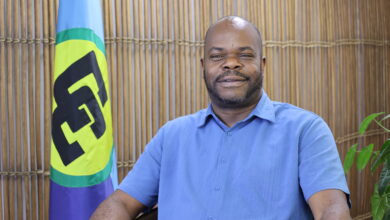1. The Third General Meeting between the United Nations Secretariat, specialized agencies, programmes and funds and the Caribbean Community (CARICOM) Secretariat and associated institutions was convened in New York on 12 and13 April 2004. The CARICOM Delegation was led by Secretary-General, Mr. Edwin W. Carrington. The United Nations Deputy Secretary-General, Ms. Louise Fréchette, opened the meeting on behalf of the UN system. The meeting was attended by a number of senior and other UN officials.
2. In his opening statement, Secretary-General Carrington stressed the importance of sustainable development, particularly in relation to small islands developing states. He detailed CARICOM's efforts and progress regarding the implementation of the CARICOM Single Market and Economy and its institutions and principles, notably the Caribbean Court of Justice and the free movement of persons and freedom of establishment. He indicated the region's progress to date in attaining the Millennium Development Goals, cautioning that considerable investment would be required in the areas of health and education to fulfill them. He also underlined the critical issues of food security, poverty alleviation and capacity-building, especially in the area of information and communication technology.
3. Deputy Secretary-General Fréchette emphasized the need for an international trading system that brings development gains on the basis of a restored Doha process. She noted that cooperation would be necessary to build up capacity, diversify exports and avoid a resort to protectionism. She stressed the importance of combating the HIV/AIDS epidemic in the region and made specific reference to the Barbados Programme of Action for the Sustainable Development of Small Island Developing States. Concerning regional security, she called for further cooperation among the United Nations, CARICOM and the OAS and increased efforts to fight such threats as political violence, money laundering, drug trafficking and smuggling.
4. A number of issues were discussed in connection with cooperation between CARICOM and the United Nations system, following the Second General Meeting held in Nassau, The Bahamas, in March 2000. While satisfaction was expressed with the implementation of the Nassau decisions, a number of constraints and lessons-learned were identified in order to improve cooperation between CARICOM and the United Nations system. Cooperation required an integrated and inter-sectorial approach as well as a strategic programming framework to coordinate technical assistance by the United Nations system.
5. The discussion covered the following main themes: the positioning of CARICOM in the global economy; Caribbean human and social development; issues of regional security; and institutional arrangements and training.
6. The meeting noted progress made on a wide range of activities in which CARICOM and its associated institutions and the United Nations system have cooperated, including:
a. The establishment of the CARICOM Single Market and Economy and its related institutions.
b. The Barbados Programme of Action for the Sustainable Development of Small Island Developing States.
c. Combating the HIV/AIDS epidemic.
d. Capacity building for strengthening institutions and human resource development.
e. Human, economic and social development in the Caribbean region.
f. Information and communication technology.
g. Environmental policies, disaster management and climate risk management.
h. Gender-sensitive social policies, the Caribbean youth strategy programme and child development initiatives. Implementation of the Regional Framework for Children and other strategies on adolescent and youth development as a contribution towards achieving the Millennium Development Goals.
i. Social statistics and capacity building for monitoring the Millennium Development Goals.
j. Agricultural sector and rural development and its critical importance to food security and poverty reduction.
7. Future cooperation and coordination between the Caribbean Community and the United Nations system should focus on a number of priority issues, including:
a. Efforts to facilitate the implementation of the CARICOM Single Market and Economy. Support of infrastructures for a common capital market, financial services sector and tourism. Assistance for the development of national integration and public education programmes and the strengthening of CARICOM's legal status.
b. Increased cooperation on training, education and retooling in all sectors, with a particular view to strengthening national and regional institutions and to retaining skilled human resources.
c. Information and communication technology and knowledge management systems.
d. Further implementation of the Barbados Programme of Action for the Sustainable Development of Small Island Developing States, particularly in the context of the upcoming ten-year review in Mauritius in August/September 2004.
e. Efforts to implement resolution 54/224 promoting an Integrated Management Approach to the Caribbean Sea in the context of sustainable development.
f. Increased cooperation on disaster reduction and management, including flood hazard management, capacity building, hazard mapping and vulnerability assessments.
g. Further cooperation on sustainable land development and efficient marine management to ensure food self-sufficiency. Research and development in support of regional agricultural initiatives and rural development programmes.
h. Support for the integration of the informal into the formal economy; employment; and the development of small and medium enterprises. Improvement of occupational health and working conditions.
i. Support for the implementation of the Action Plan of CARICOM's Regional Task Force on Crime and Security.
j. Continued focus on HIV/AIDS, the access to care and treatment, and the integrated multi-sectorial approach to prevention. Increased control of chronic non-communicable diseases. The impact of social inequity on human and social development within and between countries.
k. The need for a human rights based approach to promoting development and peace in the Caribbean region.
l. Efforts towards gender mainstreaming and the advancement of women in all priority sectors of collaboration. Prevention of gender-based violence and trafficking.
m. Renewed focus on issues related to the Caribbean's ageing population.
n. Protection of intellectual property rights to promote wealth creation and social and cultural development.
o. The need for an enhanced and more active regional and sub-regional agricultural policy and the coordination of these with macroeconomic policies.
p. Further cooperation on regional security efforts among the UN, CARICOM and the OAS in early warning, conflict prevention, peace-, confidence- and security-building measures. This includes projects to assist CARICOM Members to ratify disarmament related treaties and to build national and regional capacities for combating the illicit trade in small arms and light weapons.
q. Cooperation in the strengthening of justice systems, the reduction of crime and the use of best practices in good governance and promoting democracy.
r. Engagement and empowerment of civil society organizations in national and regional peace and development initiatives.
s. Coordination and cooperation between UN field offices and CARICOM and development of a mechanism for a continuous information flows between the Secretariats.
t. Acceleration of the process for signing Memoranda of Understanding with specific agencies as a means of revitalizing and strengthening on-going cooperation in specific areas of social development.
u. The need to review and streamline existing mechanisms for coordination, cooperation and reporting.
8. The meeting suggested increased support for the institutional and programmatic cooperation between the Caribbean Community and the United Nations.
9. It was agreed that the report of the meeting would be finalized shortly and circulated among the participants of the meeting.





